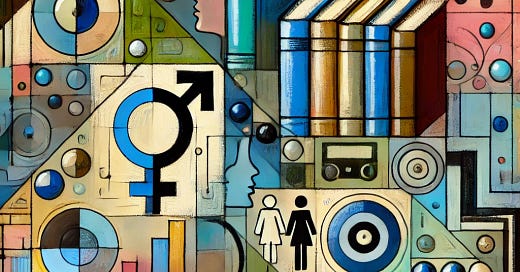Warum lesen weiße Hetero-Männer keine Romane?
Ich fühle mich als großteils nur Sachbücher-Lesender ertappt und zitiere aus einem Beitrag des Online-Magazins “Dazed”:
In 2023, women made up 80 per cent of the book-buying market in the UK, US, and Canada, and accounted for 65 per cent of all fiction purchases in the UK according to Nielson BookData. The bookish man is a rare species. Case in point: 1.2 million people follow the @hotdudesreading Instagram.
Meanwhile, masculinity continues to be in crisis. Men between the ages of 18 and 34 feel the most pressure of any generation to conform to ‘masculine’ behaviours. In the absence of a positive blueprint of how to exist in the post-MeToo world, a community of podcasting ‘manfluencers’, including ex-navy SEALs Jocko Willink and David Goggins and neuroscientist Dr Andrew Hubermann, have rushed in to promote their idea of what masculinity should look like. Self-improvement, ambition, and ‘growth mindsets’ are the banner messaging of this male-coded media world where Andrew Tate reigns supreme and the aim of the game is to optimise every waking moment to become a financially successful ‘sigma’. Doubtless many men enjoy the fact that reading non-fiction gives them an excuse to peacock their newfound knowledge and mansplain their latest read to their next Hinge date, too (bonus points if it’s Capitalist Realism).
This idea of the hyper-capitalist man with no time for something as ‘pointless’ as reading began to take root in the Victorian era. In the 19th century, reading novels developed a reputation as a frivolous and feminised activity as bourgeois women, imprisoned in the private sphere, took up reading bodice-ripping paperbacks as a pastime. Conversely, ‘serious men’ of the public sphere incubated capitalist messaging: any interest in reading had to be justified by practical utility. While for most of British history, men’s literacy rates far outstripped women’s, by 1900 literacy was actually more diffused among women. As author Leah Price put it in her book How to Do Things with Nooks in Victorian Britain: “Once a sign of economic power, reading is now the province of those whose time lacks market value.”




